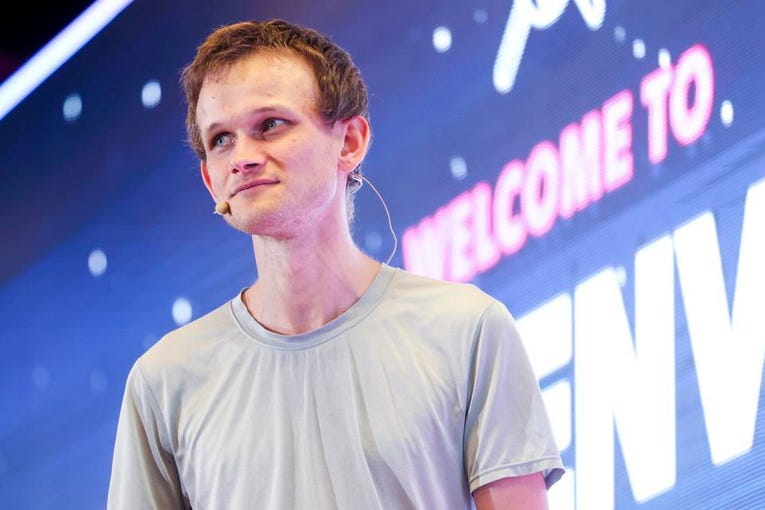Vitalik Buterin Salary
Vitalik Buterin’s salary is $0.978 million per year and gets a monthly salary of $163,667, he is a Russian-born Canadian programmer and writer who is best known as one of the co-founders of Ethereum.
| Year | Salary Per Year | Salary Per Month |
| 2022 | $0.978 million | $163,667 |
| 2021 | $0.675 million | $120,333 |
Vitalik Buterin Net Worth 2023
Vitalik Buterin has a net worth of $1.5 billion dollars as of 2022. He has accumulated his net worth with the versatility he has shown in each field he has worked in.
His main source of earnings comes from his career as a programmer and writer.
| Year | Net Worth |
| 2023 | $1.5 billion |
| 2022 | $1.4 billion |
| 2020 | $0.9 billion |
| 2019 | $0.7 billion |
| 2018 | $0.5 billion |
Buterin began writing for a publication called Bitcoin Weekly in 2011 after meeting someone on a bitcoin forum with the intention of earning bitcoin.
The owner offered five bitcoin (approximately $3.50 at the time) to anyone who wrote an article for him. Buterin contributed to the site until it was forced to close due to a lack of revenue.
In September 2011, Buterin was approached by Mihai Alisie about launching a new print publication called Bitcoin Magazine, a position he would accept as the first co-founder and contribute to as a leading writer.
Bitcoin Magazine, which began publishing a print edition in 2012, has been dubbed the “first serious publication dedicated to cryptocurrencies.”
Buterin applied for a job at Ripple while working for Bitcoin Magazine and was accepted. However, their proposed employment fell through after Ripple was unable to support Buterin’s U.S. visa.
Furthermore, in 2016, he served on the editorial board of Ledger, a peer-reviewed scholarly journal that publishes full-length original research articles on cryptocurrency and blockchain technology.
Buterin is a co-founder and inventor of Ethereum, which is described as a “decentralized mining network and software development platform rolled into one” that enables the development of new cryptocurrencies and programs that share a single blockchain (a cryptographic transaction ledger).
Ethereum was first described in a white paper by Buterin in November 2013. Buterin had argued that a scripting language was required for bitcoin application development. When he couldn’t get agreement, he proposed creating a new platform with a more general scripting language.
In late 2013 and early 2014, the Ethereum white paper was distributed, and interest in the new protocol grew. Buterin made a more public announcement about Ethereum on January 26 at the North American Bitcoin Conference in Miami.
Buterin gave a 25-minute speech in which he described Ethereum as a general-purpose global computer operating on a decentralized permissionless network, concluding with potential applications for Ethereum ranging from crop insurance to decentralized exchanges to DAOs.
“I am truly grateful to have the opportunity to work in such an interesting and interdisciplinary area of industry, where I have the chance to interact with cryptographers, mathematicians, and economists prominent in their fields, to help build software and tools that already affect tens of thousands of people around the world, and to work on advanced problems in computer science, economics, and philosophy every week,” Buterin said about the Ethereum Project in 2020.
However, his father suggests in a 2018 New Yorker article that Buterin is attempting to avoid the spotlight as the philosopher king of the blockchain world, stating, “He is attempting to focus his time on research.” He’s not overjoyed that the community thinks so highly of him. He wants the community to be stronger.”
Buterin stated that he was inspired to create decentralized money after his World of Warcraft character was nerfed by patch 3.1.0. In his about.me bio, he continues, “I happily played World of Warcraft from 2007 to 2010, but one day Blizzard removed the damage component from my beloved warlock’s Siphon Life spell. I cried myself to sleep, and on that day I realized what horrors centralized services can bring. I soon decided to quit.”
Age, Early Life, Parents
Buterin was born in 1994 in Kolomna, Russia. His father was an information scientist. He lived in the area until he was six years old, when his parents moved to Canada in search of better job opportunities.
Buterin was placed in a gifted class in grade three of elementary school in Canada and was drawn to mathematics, programming, and economics.
Buterin then attended The Abelard School, a Toronto-based private high school. Buterin learned about Bitcoin from his father when he was 17 years old.
Buterin went to the University of Waterloo after high school. There, he took advanced courses and worked as a research assistant for cryptographer Ian Goldberg, co-creator of Off-the-Record Messaging and former chairman of the Tor Project’s board of directors.
He won a bronze medal at the International Olympiad in Informatics in Italy in 2012.
In 2013, he traveled to other countries to meet developers who shared his passion for coding. Later that year, he returned to Toronto and published a white paper proposing Ethereum. He dropped out of university in 2014 after receiving a $100,000 grant from the Thiel Fellowship, a scholarship established by venture capitalist Peter Thiel, and went to work full-time on Ethereum.
On the occasion of the Dies Academicus, Buterin was awarded an honorary doctorate by the University of Basel’s Faculty of Business and Economics on November 30, 2018.

